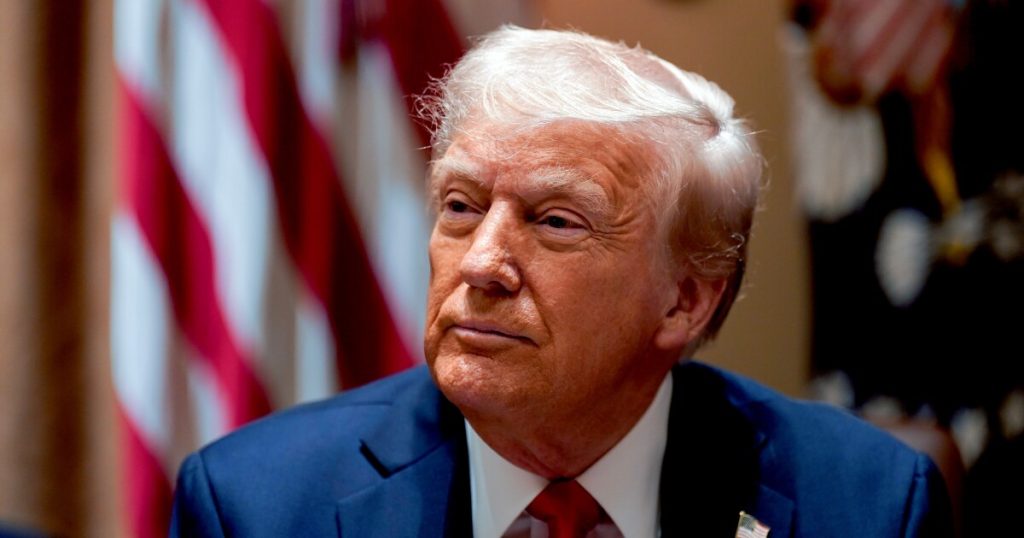President Donald Trump said 25% tariffs on Canada and Mexico are on track to go into place on Tuesday and he plans to impose an additional 10% tax on Chinese imports — moves that would deepen his fight with the nation’s largest trading partners.
The president paused the sweeping duties on Canada and Mexico on Feb. 3 for one month after both countries’ leaders announced new border security measures. But the U.S. president recently sowed confusion about whether they would take effect once the grace period ended.
Trump said Thursday in
“We cannot allow this scourge to continue to harm the USA, and therefore, until it stops, or is seriously limited, the proposed TARIFFS scheduled to go into effect on MARCH FOURTH will, indeed, go into effect, as scheduled,” the president wrote on Truth Social. “China will likewise be charged an additional 10% Tariff on that date.”
The new tariffs on China come on top of a previous 10% duty he allowed to take effect earlier this month, when he delayed tariffs on Canada and Mexico. The 25% tariffs apply to all Canadian and Mexican imports, except for energy products from Canada, which will be taxed at 10%.
Trump’s latest tariff threat rattled financial markets. The Bloomberg Dollar Index rose to a session high, with the loonie, peso and offshore yuan all falling. S&P 500 futures pared gains and oil hit the day’s highs.
Trump at a cabinet meeting on Wednesday appeared to conflate the North American tariffs, which are tied to drug trafficking and illegal migration, with separate reciprocal duties his administration has planned on nations worldwide.
“The April Second Reciprocal Tariff date will remain in full force and effect,” the president wrote on Thursday.
Lobbying effort
Trump’s announcement is sure to heighten the intensity of a lobbying effort already underway by Canada and Mexico to secure an additional reprieve. Concessions offered by Canadian Prime Minister Justin Trudeau and Mexican President Claudia Sheinbaum helped persuade Trump to call off the tariffs at the last minute.
Public Safety Minister David McGuinty, fentanyl czar Kevin Brosseau, Transport Minister Anita Anand and Agriculture Minister Lawrence MacAulay were among the Canadian officials who traveled to Washington this week to make the case to the Trump administration that Canada should not face tariffs. The group is expected to meet with Trump border czar Tom Homan, according to people familiar with the matter.
“We are quite convinced that the efforts we’ve made thus far should satisfy the U.S. administration,” McGuinty said Thursday in Washington. “By getting our message across today and tomorrow and yesterday as well, that the message is getting through.”
Canada authorized a $901 million plan last month to add more resources to patrol its border with the U.S., including helicopters, named a new fentanyl czar and designated seven Mexican cartels as terrorist organizations. Mexico agreed to send 10,000 National Guard troops to the border to help stem the flow of fentanyl and migrants into the U.S.
Sheinbaum said Wednesday she could speak to Trump “if needed” amid efforts to deter him from imposing the tariffs.
Economic disruption
Trump’s brinkmanship puts the three North American trading partners back on the precipice of a trade war, which economists say would hurt U.S. growth, worsen inflation and possibly spark recessions in Mexico and Canada.
The three nations have integrated their supply chain over the past several decades, from automobiles to produce, and new tariffs risks destabilizing the North American trade pact Trump signed during his first term. Trade in goods and services between Canada and the U.S. was around $920 billion in 2023, while Mexico-US trade was nearly $900 billion, according to U.S. Commerce Department data.
Trump had, for the most part, treaded more carefully on China, the third-largest U.S. trading partner, during the initial weeks of his term, but his latest pledge to tack on more tariffs could inflame tensions with Beijing.
Higher consumer prices could risk political backlash for Trump, who was elected last year amid voter frustration about sticky inflation. About 60% of U.S. adults expect Trump’s tariffs will lead to higher prices and 44% say the levies will likely be bad for the U.S. economy — compared with 31% who say they’d be a boost, according to a Harris poll conducted for Bloomberg News.

